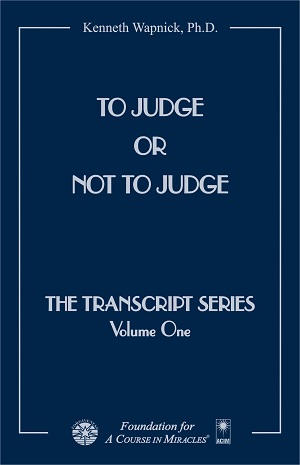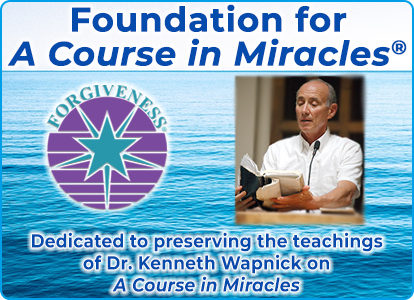The Transcript Series - Volume One
Transcript Series - Vol. 1

To Judge or Not to Judge
Kenneth Wapnick, Ph. D.
June 1990
Introduction: Judgement and the Authority Problem
Introduction: Judgement
and the Authority Problem
The title of the workshop, “To Judge or Not to Judge” is obviously taken from the famous line from Hamlet, “To be or not to be.” Unfortunately, this is not what the right question is, because as we’ll be talking about later on, we cannot avoid judging. And the real question is not whether we judge or do not judge, but with whom do we make our judgments. Do we make them with the ego or the Holy Spirit?
I think one of the confusions many students of the Course have is in thinking that when the Course says not to judge, it means not to make judgments such as what I’m going to eat tonight, or what color suit or dress I’m going to put on, or where I’m going to spend my weekend or with whom. That’s not what the Course is talking about. What it means, again, by not judging, is not to condemn and not to attack. Clearly, if the Holy Spirit is our guide in judgment, then what we judge will not be an attack. And when the Holy Spirit is not our guide and the ego is our guide, which really are the only choices open to us, then it must be an attack. And we’ll spend a lot of time this weekend talking about that.
I just wanted to begin by reading a couple of lines from the text, page 47. It’s the second paragraph. Judgment is perhaps one of the most important concepts that the Course addresses. One of the characteristics of God’s teachers is tolerance, (M-4.III). In the discussion of tolerance, it is really talking about not judging. And this passage I’m going to read from now makes that very clear.
(T.3.VI.3:1) You have no idea of the tremendous release and deep peace that comes from meeting yourself and your brothers totally without judgment.
“Without judgment” here means without seeing someone else as separate, without attacking or condemning. I think that this line is extremely important to always keep in mind. It’s Jesus’ way of reminding us that we have no idea of the gain to us when we’re able to give up our judgments and our attack thoughts. If we are truly serious about finding the peace of God, then the only way we can find that peace and experience that peace and His love is to give up judgment. In effect, we could say that the whole Course in Miracles, one of its major purposes, is to show us first how we’re judging all the time, and not judging with love; and then to give us the means whereby we can change our minds about these judgments.
(T.3.VI.3:2-3) When you recognize what you are and what your brothers are, [which is really that we’re all part of the same Christ] you will realize that judging them in any way is without meaning. In fact, their meaning is lost to you precisely because you are judging them.
We’ll see in just a minute as I discuss the origin of judgment, that the whole purpose and motivation in back of our judgments and holding onto grievances and choosing right from wrong and dividing up the world into good versus evil, etc., etc., the whole motivation in that is precisely to keep the true meaning of ourselves hidden from us. And that meaning is that we’re all one in Christ. That remembrance is what the Course refers to as the Atonement principle; namely, that the separation from God never truly happened.
Our judgments are not something that occur to us or that spontaneously arise in our minds. Rather, our judgments are things that we choose specifically to further our identity with the ego and to attack the Holy Spirit’s love in our mind, again, which is a love that sees all people as being one.

